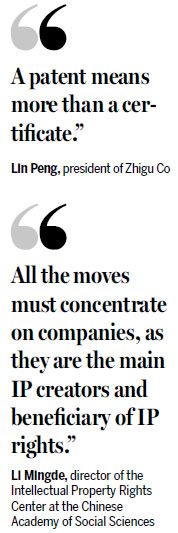Despite decades of improvement, the intellectual property rights system in China is meeting new challenges and needs new strategies, said industry insiders and scholars at the fifth China IP Annual Forum on Jan 9 in Beijing.
With the rapid development of the Internet, many IP rights holders have difficulties collecting legal evidence in growing online infringement, said Chen Xiaoyan, vice-president of Shanghai-based Sinofaith IP Group.
But she noted every online behavior "leaves traces" that can be hunted down.
Chen suggested a supervisory system covering online shopping portals, social media, search engines and ads that identifies the most likely counterfeiters and sellers. The system would not only help consumers distinguish fakes from the real thing, but also offer a truer picture of the market to IP managers in companies.
Qu Xiaoyang, IP supervisor at Siemens Ltd China, said IP awareness in Chinese companies has been on the rise over the past decade and increasing numbers of companies have established IP departments led directly by top management, all showing a more important role for IP in their strategies.
IP specialists who were before simply responsible for patent applications are now more involved in overall company strategies, Qu said.
Yet Lin Peng, president of the Beijing-based IP investment firm Zhigu Co, called for improved professionalism in IP management and protection.
"A patent means more than a certificate," he said. "It should be seen as an asset and its owner's operations might affect its value when it is transferred.
"During the sale of IP rights, a company should consider how a package of IP will benefit its industry chain and bring advantages in the market - which should all be represented in the contract," he said.
He also highlighted new models that encourage innovation. One example is the Ruichuang Patent Management Foundation, the first in the nation to focus on patent management and technology transfers.
"It is not a research institution and does not make any product, but it cooperates with research institutions and universities, and invests in invention," said Lin. "It then integrates patents and provides services to companies."
Wu Zheng, product supervisor at IPTalent Consulting Co, called for "open innovation" because it is difficult for a company to develop all technologies it needs on its own.
Focusing on cooperative innovation and patent licensing, the approach reduces R&D costs, increases profits and speeds up commercialization. But he added that challenges include how to identify, evaluate and acquire potential technologies and how to specify a patent's ownership in the contract.
As a milestone in the nation's IP, newly founded IP courts in Beijing, Shanghai and Guangzhou also attracted the attention of the delegates.
Chen Jinchuan, deputy chief of the Beijing IP court that opened on Nov 6 last year, said at the forum that the court serves as "an explorer and forerunner in the journey of China's judiciary reform".
By Jan 7, the court had accepted more than 560 cases at the first instance, including 278 involving trademarks and 116 about patents. Du Changhui, head of the court's case registration office, said the court will receive at least 15,000 cases a year.
"From making the decision to establish IP courts to revising IP laws and issuing IP policies, all the moves must concentrate on companies, as they are the main IP creators and beneficiary of IP rights," said Li Mingde, director of the Intellectual Property Rights Center at the Chinese Academy of Social Sciences.
zhangzhao@chinadaily.com.cn

